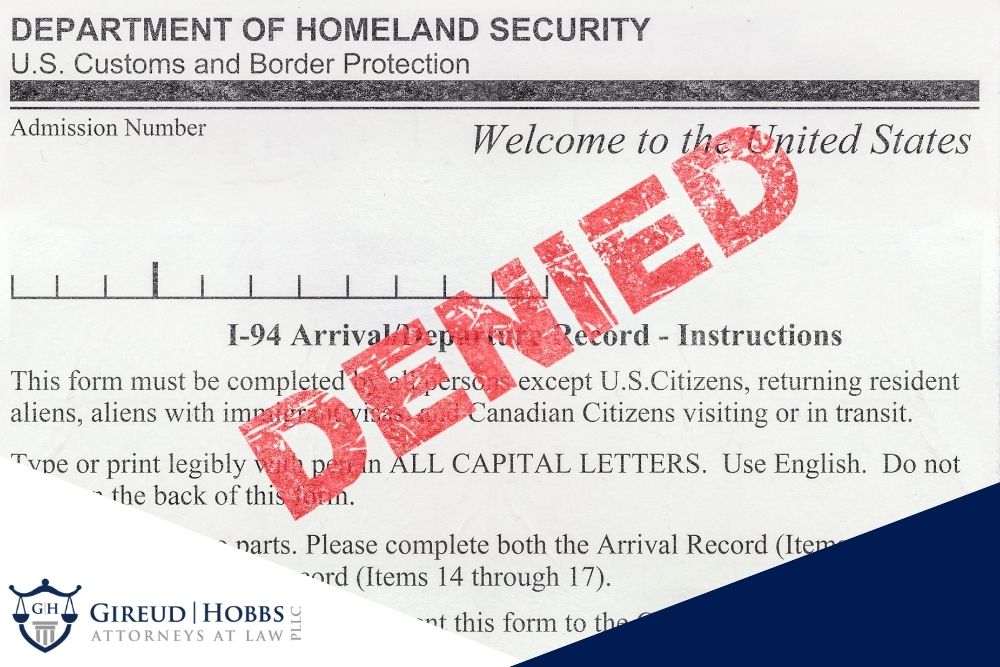Immigration appeals are notoriously difficult – and knowing that if you fail, the government will uphold its original decision, can make the whole process extremely stressful. For many people, it makes sense to work with a San Antonio immigration attorney for an immigration appeal.
Immigration Appeals in San Antonio: What You Need to Know
An immigration appeal is a request to a different authority to review an unfavorable decision.
If you’ve been denied an immigration benefit, you may be able to ask for an appeal. That means the original judge in your case won’t be the same person who reviews it – your case will instead go before the next-higher authority.
There are two agencies that can review the original decision made on your immigration case: the Administrative Appeals Office (AAO) of the United States Citizenship and Immigration Services, or the Board of Immigration Appeals (BIA) of the U.S. Department of Justice.

What Do You Need to Show to File an Appeal?
When you file an appeal, you must provide an explanation of why you think the original decision was wrong. Your attorney can put together your appeal for you so you don’t have to worry about it.
Your attorney will most likely submit a brief with your Notice of Appeal (Form I-290B). A brief is a legal document that attorneys use to argue that the judge should agree with them. The reason most attorneys submit briefs is that neither the AAO nor the BIA usually hear oral arguments; that means what’s contained in the brief is all the boards and officers will know about your case. The brief must contain a strong argument in your favor.
Request A Free Consultation Today!
Law Services
Request A Free Consultation Today!
 Cases that the Administrative Appeals Office Hears
Cases that the Administrative Appeals Office Hears
The Administrative Appeals Office hears USCIS cases involving:
- Adjustment of Status applications
- Applications for Temporary Protected Status
- Investment-based and employment-based visas
- Petitions involving orphans, juveniles, special immigrants and religious workers
- Petitions involving temporary labor, services or training
Cases That the Board of Immigration Appeals Hears
The Board of Immigration Appeals hears cases involving decisions by immigration judges and sometimes those involving decisions by Department of Homeland Security officials. It does not hear appeals of decisions made by the U.S. Citizenship and Immigration Services. Those cases must be appealed to the AAO. You can appeal the following types of cases to the BIA:
- Asylum
- Denial of bond or parole
- Exclusion of aliens applying for admission to the United States
- Family-based immigrant petitions (after DHS decisions)
- Motions to reopen and reconsider prior decisions
- Petitions to classify the status of alien relatives who want preference immigrant visas
- Removal, deportation and exclusion orders
- Some DHS administrative fines and penalties
- Waivers of inadmissibility (after DHS decisions)
- Withholding of removal (deportation)
Motions Versus Immigration Appeals
Motions are different from immigration appeals. In some cases, attorneys file motions when an appeal isn’t necessary.
A motion is a request for the original decision-maker in a case to review their decision. There are two types of motions your attorney may choose between if you receive an unfavorable immigration decision: a motion to reopen and a motion to reconsider.
Motions to Reopen an Immigration Case
A motion to reopen an immigration case requests the original decision-maker to review his or her original decision because there’s new evidence or changed circumstances within the case. When your attorney files a motion to reopen your immigration case, he or she will provide the original decision-maker with the new evidence or evidence of your changed circumstances. Your lawyer will also explain why the new evidence or changed circumstances should change the outcome of your case.
Motions to Reconsider an Immigration Case
A motion to reconsider an immigration case requests a review of the original decision based on new or additional legal arguments. That means your lawyer can use a motion to reconsider when new legislation or case studies come out that could change the outcome of your case.
Commonly Asked Questions About Immigration Appeals
The following sections address frequently asked questions about immigration appeals. If you don’t see the answer to your question here, please feel free to call our office and schedule a consultation – we’ll be happy to give you the guidance you need.
What Should I Do if I’m Unhappy With a USCIS Decision?
If USCIS makes an unfavorable decision in your case – one that you disagree with – you may be eligible to file an appeal or a motion. Your attorney can handle either scenario for you. If you appeal, you’re asking a higher authority to look at your case and come up with a new judgement. If you file a motion, you’re asking the original decision-maker to review the circumstances of your case. You don’t need new evidence to file a motion, though it can help you get a better outcome. Your San Antonio immigration attorney will know which is the best option in your case.
Can I Appeal a Visa Denial or Revocation?
If you are the original petitioner – that is, if you’re the person who applied for the visa – you may be able to file an appeal or motion for a visa denial or revocation. However, usually, the beneficiary cannot file an appeal. For example, if your fiancé applies for a visa to bring you to the United States so you can get married and the petition is denied, only your fiancé can appeal the decision; you can’t, because you’re the beneficiary.
There is an exception, though: If you fill both roles, you can file an appeal or motion. For example, if you’re a VAWA self-petitioner or the widow(er) of a U.S. citizen, you fill both roles. If you’re not sure about how your situation works, you should consult a San Antonio immigration attorney for advice.
How Can I File an Immigration Appeal?
Many people choose to work with an attorney on immigration appeals. Working with a lawyer can remove all the guesswork – and it can ensure that you take the approach that gets you the best possible outcome. Immigration attorneys know the law inside and out.
Remember, you always have the right to seek legal counsel. Your attorney can explain your options for your appeal, fill out and file the appropriate forms, and include a convincing brief with your petition to appeal, or file a motion on your behalf. Although there’s no way to predict how a judge or immigration official will rule, working with a San Antonio immigration attorney can give you the peace of mind you need after you receive an unfavorable immigration decision.
How Long Can I Wait Before Filing an Immigration Appeal?
Usually, you must file an appeal within 30 days of receiving an unfavorable immigration decision. The document you receive from immigration authorities will let you know how long you have to appeal.
Do You Need to Talk to a San Antonio Immigration Attorney About an Immigration Appeal?
If you’re unhappy with an immigration decision you’ve received, you may have grounds to appeal. You may benefit from talking to a San Antonio immigration attorney about your options, so call us today to schedule your free consultation. We’ll be happy to answer your questions and point you in the right direction.

